The crimes of Winston Churchill
Churchill was a genocidal maniac. He is fawned over in Britain and held up as a hero of the nation — voted ‘Greatest Briton’ of all time. Below is the real history of Churchill. The history of a white supremacist whose hatred for Indians led to four million starving to death. The man who loathed Irish people so much he conceived different ways to terrorise them. A racist thug who waged war on black people across Africa and in Britain. This is the trial of Winston Churchill, the enemy of all humanity.

Afghanistan:
Churchill found his love for war during the time he spent in Afghanistan. While there he said “all who resist will be killed without quarter” because the Pashtuns need “recognise the superiority of race”. He believed the Pashtuns needed to be dealt with, he would reminisce in his writings about how he partook in the burning villages and peoples homes.
“We proceeded systematically, village by village, and we destroyed the houses, filled up the wells, blew down the towers, cut down the great shady trees, burned the crops and broke the reservoirs in punitive devastation.” — Churchill on how the British carried on in Afghanistan, and he was only too happy to be part of it.
Churchill would also write of how “every tribesman caught was speared or cut down at once”. Proud of the terror he helped inflict on the people of Afghanistan Churchill was well on the road to becoming a genocidal maniac.
Cuba:

Churchill wrote that he was concerned Cuba would turn in to “another black republic” in 1896. By “another” he was referring to Haiti which was the first nation in modern times to abolish slavery. Haiti has been punished for doing so ever since.
Egypt:

“Tell them that if we have any more of their cheek we will set the Jews on them and drive them into the gutter, from which they should never have emerged” — Winston Churchill on how to deal with Egypt in 1951.
Greece:
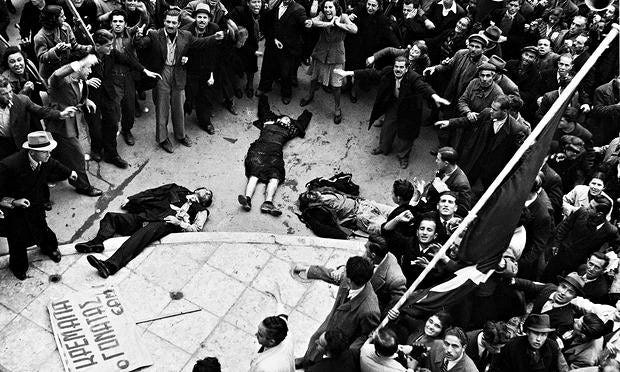
The British Army under the guidance of Churchill perpetrated a massacre on the streets of Athens in the month of December 1944. 28 protesters were shot dead, a further 128 injured. Who were they? Were they supporters of Nazism? No, they were in fact anti-Nazis.
The British demanded that all guerrilla groups should disarm on the 2nd December 1944. The following day 200,000 people took to the streets, and this is when the British Army on Churchill’s orders turned their guns on the people. Churchill regarded ELAS (Greek People’s Liberation Army) and EAM (National Liberation Front) as “miserable banditti” (these were the very people who ran the Nazis out). His actions in the month of December were purely out of his hatred and paranoia for communism.
The British backed the right-wing government in Greece returned from exile after the very same partisans of the resistance that Churchill ordered the murder of had driven out the Nazi occupiers. Soviet forces were well received in Greece. This deeply worried Churchill. He planned to restore the monarchy in Greece to combat any possible communist influence. The events in December were part of that strategy.
In 1945, Churchill sent Charles Wickham to Athens where he was put in charge of training the Greek security police. Wickham learned his tricks of the trade in British occupied Ireland between 1922–1945 where he was a commander of the colonial RUC which was responsible for countless terror.
In April 1945 Churchill said “the [Nazi] collaborators in Greece in many cases did the best they could to shelter the Greek population from German oppression” and went on to say “the Communists are the main foe”.
Guyana:

Churchill ordered the overthrowing of the democratically elected leader of ‘British Guiana’. He dispatched troops and warships and suspended their constitution all to put a stop to the governments nationalisation plan.
India:

“I’d rather see them have a good civil war”. — Churchill wishing partition on India
Very few in Britain know about the genocide in Bengal let alone how Churchill engineered it. Churchill’s hatred for Indians led to four million starving to death during the Bengal ‘famine’ of 1943. “I hate Indians. They are a beastly people with a beastly religion” he would say.
Bengal had a better than normal harvest during the British enforced famine. The British Army took millions of tons of rice from starving people to ship to the Middle East — where it wasn’t even needed. When the starving people of Bengal asked for food, Churchill said the ‘famine’ was their own fault “for breeding like rabbits”. The Viceroy of India said “Churchill’s attitude towards India and the famine is negligent, hostile and contemptuous”. Even the right wing imperialist Leo Amery who was the British Secretary of State in India said he “didn’t see much difference between his [Churchill] outlook and Hitler’s”. Churchill refused all of the offers to send aid to Bengal, Canada offered 10,000 tons of rice, the U.S 100,000. Churchill was still swilling champaign while he caused four million men, women and children to starve to death in Bengal.
Throughout WW2 India was forced to ‘lend’ Britain money. Churchill moaned about “Indian money lenders” the whole time.
The truth is Churchill never waged war against fascism. He went to war with Germany to defend the British Empire. He moaned “are we to incur hundreds of millions of debt for defending India only to be kicked out by the Indians afterwards”.
In 1945 Churchill said “the Hindus were race protected by their mere pullulation from the doom that is due”. The Bengal famine wasn’t enough for Churchill’s blood lust, he wished his favourite war criminal Arthur Harris could have bombed them.
When India was partitioned in 1947 millions of people died and millions more were displaced. Churchill said that the creation of Pakistan, which has been an imperialist outpost for the British and Americans since its inception, was Britain’s “bit of India”.
Iran:
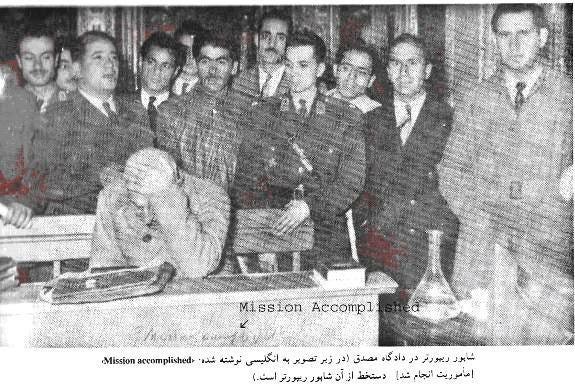
“A prize from fairyland beyond our wildest dreams” — Churchill on Iran’s oil
When Britain seized Iran’s oil industry Churchill proclaimed it was “a prize from fairyland beyond our wildest dreams”. He meddled in Iranian affairs for decades doing his utmost to exclude Iranians from their natural resources. Encouraging the looting of the nation when most lived in severe poverty.
In June 1914 Churchill proposed a bill in the House of Commons that would see the British government become become the major shareholder of the Anglo-Iranian Oil Company. The company would go on to refrain from paying Iran its share of the dividends before paying tax to the British exchequer. Essentially the British were illegally taxing the Iranian government.
When the nationalist government of Mohammad Mosaddegh threatened British ‘interests’ in Iran, Churchill was there, ready to protect them at any cost. Even if that meant desecrating democracy. He helped organise a coup against Mosaddegh in August 1953. He told the CIA operations officer that helped carry out the plan “if i had been but a few years younger, I would have loved nothing better than to have served under your command in this great venture”.
Churchill arranged for the BBC to send coded messages to let the Shah of Iran know that they were overthrowing the democratically elected government. Instead of the BBC ending their Persian language news broadcast with “it is now midnight in London” they under Churchill’s orders said “it is now exactly midnight”.
Churchill went on to privately describe the coup as “the finest operation since the end of the war [WW2]”. Being a proud product of imperialism he had no issue ousting Mosaddegh so Britain could get back to sapping the riches of Iran.
Iraq:
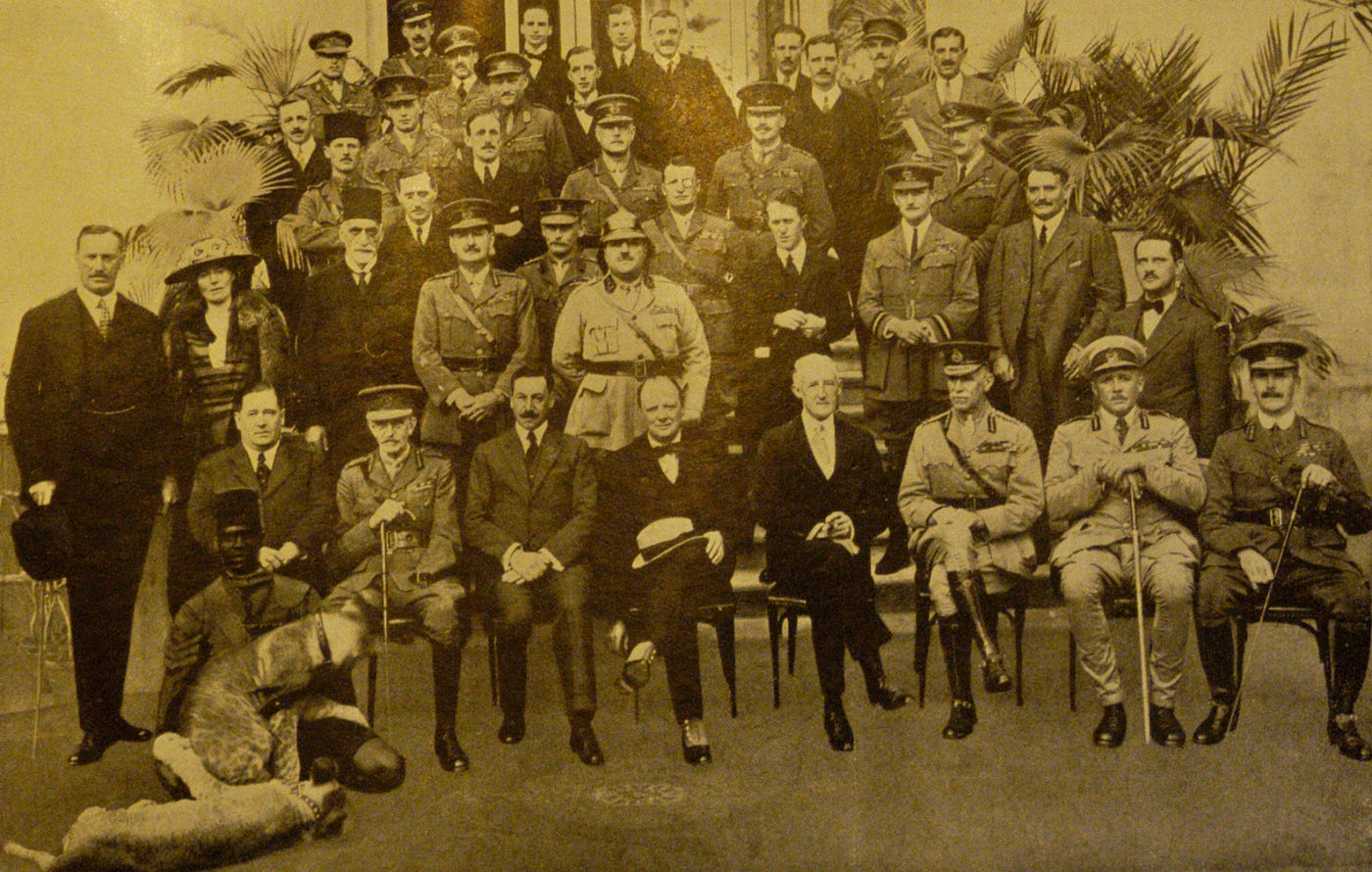
“I am strongly in favour of using poisoned gas against the uncivilized tribes… it would spread a lively terror.” — Churchill on the use of gas in the Middle East and India
Churchill was appointed ‘Secretary of State for the Colonies’ in 1921. He formed the ‘Middle East Department’ which was responsible for Iraq. Determined to have his beloved empire on the cheap he decided air power could replace ground troops. A strategy of bombing any resistance to British rule was now employed.
Several times in the 1920s various groups in the region now known as Iraq rose up against the British. The air force was then put into action, indiscriminately bombing civilian areas so to subdue the population.
Churchill was also an advocate for the use of mustard and poison gases. Whilst ‘Secretary for War and Air’ he advised that “the provision of some kind of asphyxiating bombs” should be used “for use in preliminary operations against turbulent tribes” in order to take control of Iraq.
When Iraqi tribes stood up for themselves, under the direction of Churchill the British unleashed terror on mud, stone and reed villages.
Churchill’s bombing of civilians in ‘Mesopotamia’ (Kurdistan and Iraq) was summed up by war criminal ‘Bomber Harris’:
“The Arab and Kurd now know what real bombing means within 45 minutes a full-sized village can be practically wiped out, and a third of its inhabitants killed or injured, by four or five machines which offer them no real target, no opportunity for glory as warriors, no effective means of escape”. — Arthur ‘Bomber’ Harris.
Ireland:
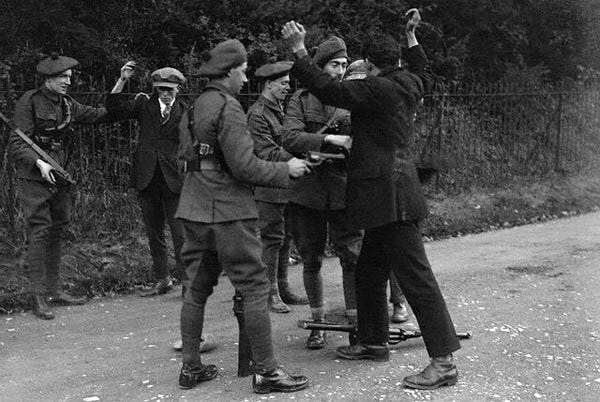
“We have always found the Irish a bit odd. They refuse to be English” — Churchill
In 1904 Churchill said “I remain of the opinion that a separate parliament for Ireland would be dangerous and impractical”. Churchill’s ancestry is linked to loyalism to Britain. He is a direct descendent of the ‘Marquis of Londonderry’ who helped put down the 1798 United Irishmen rising. He would live up to his families reputation when it came to suppressing revolutionary forces in Ireland.
The Black and Tans were the brainchild of Churchill, he sent the thugs to Ireland to terrorise at will. Attacking civilians and civilian property they done Churchill proud. Rampaging across the country carrying out reprisals. He went on to describe them as “gallant and honourable officers”.
It was also Churchill who conceived the idea of forming the Auxiliaries who carried out the Croke Park massacre. They fired into the crowd at a Gaelic football match, killing 14. Of course this didn’t fulfill Churchill’s bloodlust to repress a people who he described as “odd” for their refusal “to be English”.
He went on to advocate the use of air power in Ireland against Sinn Fein members in 1920. He suggested to his war advisers that aeroplanes should be dispatched with orders to use “machine-gun fire or bombs” to “scatter and stampede them”.
Churchill was an early advocate for the partitioning of Ireland. During the treaty negotiations he insisted on retaining navy bases in Ireland. In 1938 those bases were handed back to Ireland. However in 1939 Churchill proposed capturing Berehaven base by force.
In 1941 Churchill supported a plan to introduce conscription in the North of Ireland.
Churchill went on to remark”the bloody Irish, what have they ever done for our wars”, reducing Ireland’s merit to what it might provide by way of resources (people) for their imperialist land grabs.
Kenya:

Britain declared a state of emergency in Kenya in 1952 to protect its system of institutionalised racism that they established throughout their colonies so to exploit the indigenous population. Churchill being your archetypical British supremacist believed that Kenya’s fertile highlands should be only for white colonial settlers. He approved the forcible removal of the local population, which he termed “blackamoors”.
At least 150,000 men, women and children were forced into concentration camps. Children’s schools were shut by the British who branded them “training grounds for rebellion”. Rape, castration, cigarettes, electric shocks and fire all used by the British to torture the Kenyan people on Churchill’s watch.
In 1954 during a British cabinet meeting Churchill and his men discussed the forced labour of Kenyan POWs and how to circumvent the constraints of two treaties they were breaching:
“This course [detention without trial and forced labour] had been recommended despite the fact that it was thought to involve a technical breach of the Forced Labour Convention of 1930 and the Convention on Human Rights adopted by the Council of Europe”
The Cowan Plan advocated the use of force and sometimes death against Kenyan POWs who refused to work. Churchill schemed to allow this to continue.
Caroline Elkins book gives a glimpse into the extent that the crimes in Kenya were known in both official and unofficial circles in Britain and how Churchill brushed off the terror the colonial British forces inflicted on the native population. He even ‘punished’ Edwina Mountbatten for mentioning it, “Edwina Mountbatten was conversing about the emergency with India’s prime minister, Jawaharlal Nehru, and the then colonial secretary, Oliver Lyttleton. When Lyttleton commented on the “terrible savagery” of Mau Mau… Churchill retaliated, refusing to allow Lord Mountbatten to take his wife with him on an official visit to Turkey”.
Palestine:
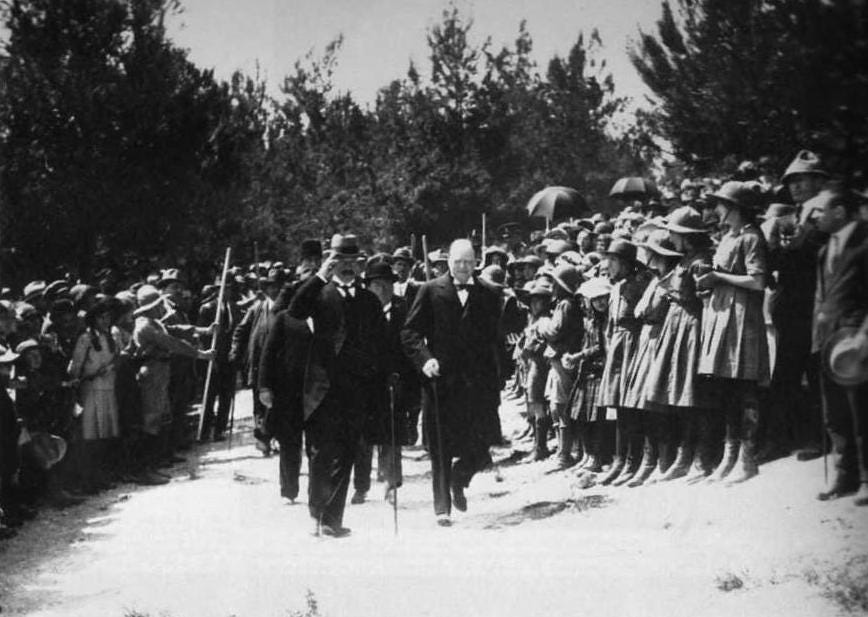
“I do not agree that the dog in a manger has the final right to the manger.”
In 2012 Churchill was honoured with a statue in Jerusalem for his assistance to Zionism.
He regarded the Arab population Palestine to be a “lower manifestation”. And that the “dog in a manger has the final right to the manger”, by this he meant the Arabs of Palestine.
In 1920 Churchill declared “if, as may well happen, there should be created in our own lifetime by the banks of the Jordan a Jewish State under the protection of the British Crown which might comprise three or four millions of Jews, an event will have occurred in the history of the world which would from every point of view be beneficial”.
A year later in Jerusalem he told Palestinian leaders that “it is manifestly right that the Jews, who are scattered all over the world, should have a national centre and a National Home where some of them may be reunited. And where else could that be but in this land of Palestine, with which for more than 3,000 years they have been intimately and profoundly associated?”.
At the Palestine Royal Commission (Peel) of 1937, Churchill stated that he believed in intention of the Balfour Declaration was to make Palestine an “overwhelmingly Jewish state”.
He went on to also express to the Peel Commission that he does “not admit for instance, that a great wrong has been done to the Red Indians of America or the black people of Australia. I do not admit that a wrong has been done to these people by the fact that a stronger race, a higher-grade race, a more worldly wise race to put it that way, has come in and taken their place”.
Four years later he wrote of his desire for a ‘Jewish state’to be established after the second war world. The establishment of the colonial settler state however was done by the British Labour Party under Attlee, who were always there to back their Tory counterparts when it came to British foreign policy.
Russia:

Churchill’s hatred and paranoia about communism saw him suggest that an atomic bomb should be dropped on the Kremlin. He believed this would “handle the balance of power”.
Saudi Arabia:
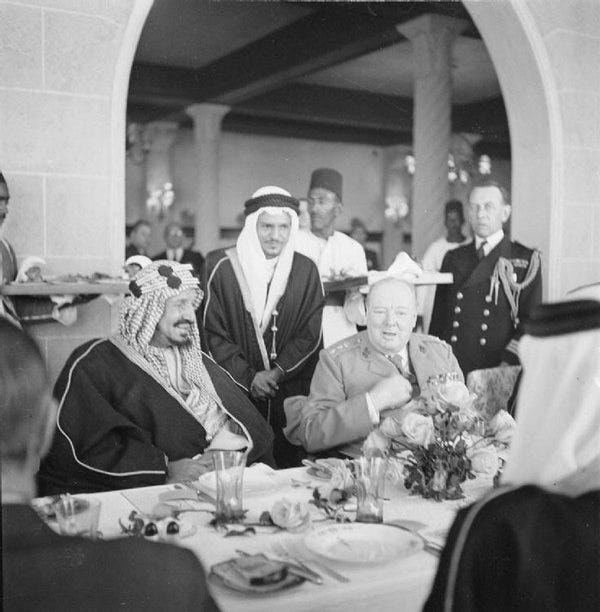
“My admiration for him [Ibn Saud] was deep, because of his unfailing loyalty to us.” — Churchill
Prior to 1922 the British were paying Ibn Saud a subsidy of £60,000 a year. Churchill, then Colonial Secretary, raised it to £100,000.
Churchill knew full well of the dangers of wahhabism. He gave a speech to the House of Commons in 1921 where he stated that Ibn Saud’s followers “hold it as an article of duty, as well as of faith, to kill all who do not share their opinions and to make slaves of their wives and children. Women have been put to death in Wahhabi villages for simply appearing in the streets… [they are] austere, intolerant, well-armed and bloodthirsty”. He was however content to use the House of Saud’s twisted ideology for the benefit of British imperialism.
Churchill went on to write that his “admiration for him [Ibn Saud] was deep, because of his unfailing loyalty to us”. He showered Ibn Saud with money and presents — gifting Ibn Saud a special Rolls-Royce in the mid 1940s.
South Africa:
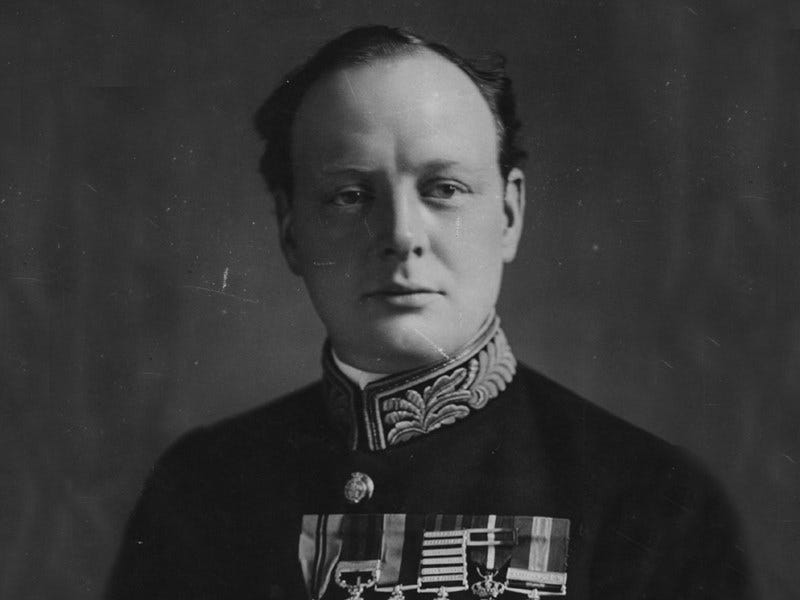
Thousands were sent to British run concentration camps during the Boer wars. Churchill summed up his time in South Africa by saying “it was great fun galloping about”.
Churchill wrote that his only “irritation” during the Boer war was “that Kaffirs should be allowed to fire on white men”.
It was Churchill who planted the seed to strip voting rights from black people in South Africa. In June 1906, Churchill argued that Afrikaners should be allowed a self-rule which would mean black people would be excluded from voting.
He went on to state to Parliament that “we must be bound by the interpretation which the other party places on it and it is undoubted that the Boers would regard it as a breach of that treaty if the franchise were in the first instance extended to any persons who are not white”.
In conclusion:
There have been a number of attempts to rehabailtate the image of the British Empire in Britain in recent years. Particularly via the medium of cinema. The film Darkest Hour didn’t show you anything about Churchill’s crimes. On the contrary it presented him as a hero. Gary Oldham won an Oscar for his portrayal of one of the most evil, imperialists ever.
British Nationalist groups in Britain hold Churchill up as their posterboy. And so they should. He was a racist to the core. In response to migration from the Caribbean to Britain he said England should “be kept white”. Throughout worl war two his cabinet obsessed over British people viewing American Black GI’s favourably. They were concerned that they would fraternised with white English women. A true believer in white supremacy, Churchill blamed the Native American and Aboriginal Australian people for their genocides. He said he did “not admit that a great wrong has been done to the red Indians and the black people of Australia.”
Winner of the Noble Prize in Literature, Churchill actually plagiarised his most well known speech from an Irish Republican called Robert Emmet who was hanged and then beheaded by the British in 1803. Winston’s famous “we shall fight them on beaches” line was lifted from Emmet’s speech from the dock.
When it came to his own fellow Brits he was less than complimentary and displayed a deep hatred for the working classes. He suggested “100,000 degenerate Britons should be forcibly sterilised”. And that for “tramps and wastrels there ought to be proper labour colonies where they could be sent”.
It needs to be put once and for all that Churchill was despicable, racist, war criminal. Some will argue his “sins” are expiated for his actions during the second world war. It is nothing but nonsense to suggest Churchill went out to fight fascism. He lauded Mussolini as a “roman genius”, donated to Nazi war criminal Erich Von Manstien’s criminal defence and sought to desperatly cling on to the British Empire from which Hitler himself took inspiration for his Reich. What we have to remember is Churchill was not a uniquely villianous British Prime Minister. He was not out of ordinary but in fact a true representation of Britain.


No comments:
Post a Comment